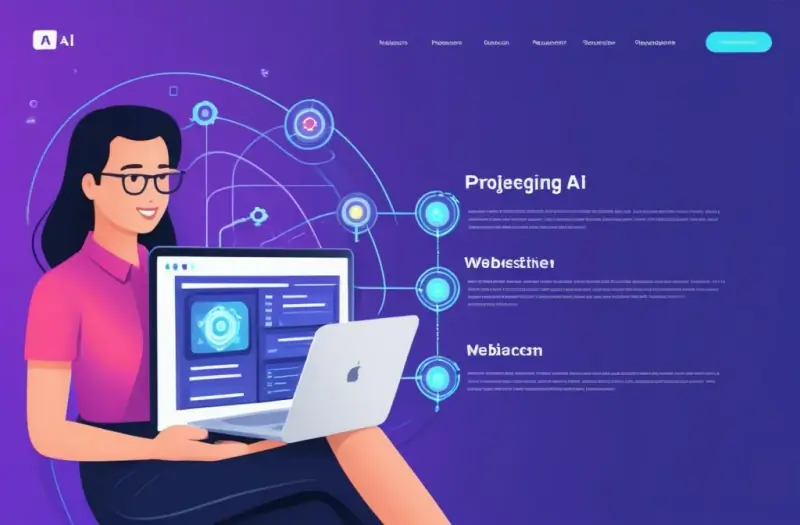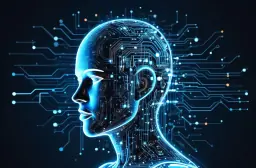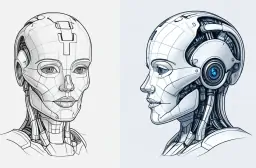AI for Website Project Management: A Step-by-Step Guide

Table of Contents
In today’s fast-paced digital landscape, managing a website project can be overwhelming. Deadlines, content updates, design revisions, and technical challenges are just a few of the many tasks that demand attention. Fortunately, Artificial Intelligence (AI) offers tools and techniques that can streamline these processes, making project management more efficient and effective. In this guide, we will explore how to use AI when project managing a website, ensuring your project stays on track and delivers exceptional results.
Introduction to AI in Website Project Management
When we think about AI, we often imagine futuristic robots or complex algorithms. However, AI’s real-world applications are far more practical, especially in the realm of website project management. By leveraging AI tools, we can automate mundane tasks, optimize workflows, and even predict potential challenges before they arise.
AI is not just a buzzword—it’s a powerful resource that can transform the way we manage website projects. Whether it’s automating content updates, enhancing team collaboration, or optimizing website performance, AI offers solutions that can significantly reduce the workload and improve project outcomes.
Understanding the Role of AI in Project Planning

Automating Task Assignments
One of the most time-consuming aspects of project management is assigning tasks to team members. With AI, this process becomes seamless. AI-powered tools can analyze the strengths and weaknesses of each team member, automatically assigning tasks to the most suitable person. This ensures that each task is handled by the right person, increasing efficiency and reducing the risk of errors.
Predictive Analysis for Better Planning
Planning is crucial for any project, but it often involves a lot of guesswork. AI can remove the uncertainty by offering predictive analysis. By analyzing past project data, AI can forecast potential bottlenecks, estimate task completion times, and even predict project outcomes. This enables us to make more informed decisions and plan more effectively.
Resource Optimization
AI can also help in optimizing resources. For example, if a particular tool or resource is underutilized, AI can flag it and suggest better ways to allocate it. This not only saves money but also ensures that all resources are being used to their full potential.
Enhancing Communication and Collaboration
AI-Powered Communication Tools
Effective communication is the backbone of any successful project. AI-driven communication tools, such as chatbots and virtual assistants, can handle routine queries, schedule meetings, and even send reminders to team members. This not only saves time but also ensures that important information is communicated promptly.
Collaborative AI Platforms
AI platforms like Trello, Asana, and Monday.com have integrated AI features that enhance team collaboration. These platforms can automatically update task statuses, notify team members of deadlines, and even suggest the next steps in a project. By using AI-driven collaboration tools, we can ensure that everyone stays on the same page, reducing the risk of miscommunication.
Real-Time Feedback
AI can also facilitate real-time feedback, allowing us to address issues as they arise. For example, AI can monitor the performance of team members and provide instant feedback, helping them to improve and stay on track. This continuous loop of feedback ensures that the project is always moving forward.
Streamlining Content Management
Automated Content Updates
Managing content is a critical aspect of website projects, and it can be a daunting task, especially for large websites. AI can automate content updates, ensuring that the website always reflects the most current information. For example, AI can automatically update blog posts, product descriptions, or even entire web pages based on predefined criteria.
Content Optimization
In addition to updating content, AI can optimize it for SEO. AI tools can analyze keywords, readability, and overall content structure, making suggestions to improve the content’s performance. This ensures that your website content is always optimized for search engines, driving more traffic and improving user engagement.
Personalized Content Delivery
AI can also enhance the user experience by delivering personalized content. By analyzing user behavior and preferences, AI can tailor the content that each visitor sees, making the website more engaging and relevant. This not only improves the user experience but also increases conversion rates.
Monitoring and Analyzing Website Performance

AI-Driven Analytics
Understanding how your website is performing is crucial for the success of any project. AI-driven analytics tools can provide real-time data on various metrics, such as traffic, bounce rates, and conversion rates. These insights allow us to make data-driven decisions and adjust our strategies to improve performance.
Automated Testing and Debugging
Testing and debugging are essential but time-consuming tasks in website project management. AI can automate these processes, identifying bugs and performance issues before they impact the user experience. By automating testing, we can ensure that the website is always functioning optimally without the need for constant manual intervention.
Performance Prediction
AI can also predict website performance based on historical data. For example, it can forecast traffic spikes and suggest ways to optimize the website to handle increased traffic. This proactive approach ensures that the website remains stable and performs well under varying conditions.
Managing Design and UX with AI
AI-Generated Design Suggestions
Design is a critical component of any website project, and AI can play a significant role in enhancing it. AI tools like Adobe Sensei can analyze user behavior and suggest design changes that improve user experience. These suggestions can range from layout adjustments to color scheme changes, all aimed at creating a more engaging website.
User Experience Optimization
AI can also optimize user experience by analyzing user interactions with the website. For example, AI can identify areas where users are dropping off and suggest changes to improve retention. This ensures that the website not only looks good but also provides a seamless and enjoyable user experience.
Personalizing the User Interface
Personalization is key to a successful user experience. AI can analyze user preferences and customize the user interface accordingly. This could involve changing the layout, adjusting the content, or even altering the color scheme based on the user’s preferences. By offering a personalized experience, we can increase user satisfaction and encourage repeat visits.
Incorporating AI in Project Reporting
Automated Reporting Tools
Reporting is a crucial part of project management, but it can be time-consuming. AI can automate this process by generating reports based on real-time data. These reports can include key metrics, performance indicators, and even predictive insights, making it easier to track project progress and make informed decisions.
Customizable Dashboards
AI can also create customizable dashboards that provide a real-time overview of the project. These dashboards can be tailored to show the most relevant data, making it easier for project managers to monitor progress and identify any potential issues. This real-time visibility ensures that we can stay on top of the project at all times.
Data Visualization
Data visualization is another area where AI excels. By using AI-powered tools, we can create visually appealing charts, graphs, and tables that make complex data easier to understand. These visualizations can be included in reports or shared with stakeholders to provide a clear picture of the project’s progress.
Stage
Traditional Method
AI-Enhanced Method
Task Assignment
Manual allocation
Automated assignment via AI
Communication
Email and meetings
AI-powered chatbots and tools
Content Management
Manual updates and SEO
Automated updates and optimization
Performance Monitoring
Manual data collection
Real-time AI-driven analytics
Design and UX
Manual design changes
AI-generated suggestions
Reporting
Manual report creation
Automated reports and dashboards
FAQs
How can AI help in managing website projects effectively?
AI can automate repetitive tasks, provide predictive insights, and optimize various aspects of project management, making the process more efficient and reducing the likelihood of errors.
What are some AI tools for website project management?
Tools like Asana, Trello, and Monday.com integrate AI features that enhance task management, collaboration, and reporting. Additionally, AI-driven content optimization tools like Grammarly and SEMrush can improve content quality.
Is AI necessary for managing small website projects?
While AI is particularly beneficial for large projects, it can also be useful for smaller projects by automating routine tasks and providing insights that improve efficiency and outcomes.
Can AI replace human project managers?
No, AI cannot replace human project managers but can serve as a powerful assistant, handling repetitive tasks and providing data-driven insights that help managers make more informed decisions.
How can AI improve website user experience (UX)?
AI can analyze user behavior to offer personalized content, suggest design improvements, and optimize the user interface, leading to a more engaging and user-friendly website.
Conclusion
AI is revolutionizing the way we manage website projects. From automating tasks to providing predictive insights, AI tools can significantly enhance efficiency, improve communication, and optimize performance. By incorporating AI into our project management processes, we can not only meet our project goals but exceed them, delivering exceptional results every time.
Key Takeaways
- AI offers powerful tools for automating and optimizing various aspects of website project management.
- From task assignment to performance monitoring, AI can streamline processes and improve efficiency.
- AI-driven communication tools enhance collaboration, ensuring that everyone stays on the same page.
- Incorporating AI in content management, design, and UX can lead to a more engaging and user-friendly website.
- AI-powered reporting tools provide real-time insights, making it easier to track progress and make informed decisions.
By embracing AI in our website project management processes, we are not only keeping up with the times but also setting ourselves up for success in the digital age.
Popular Tags
ADS SPACE HERE


